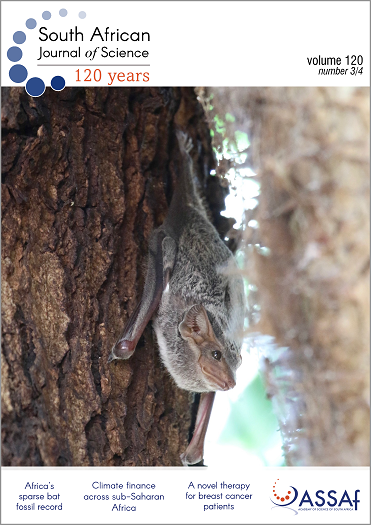Sanguinarine highly sensitises breast cancer cells to doxorubicin-induced apoptosis
DOI:
https://doi.org/10.17159/sajs.2024/14917Keywords:
breast cancer, MKP-1, doxorubicin, MAPKs, autophagy, apoptosisAbstract
Breast cancer is the most commonly diagnosed cancer and the second most common cause of cancer death in women. The anthracycline, doxorubicin, is a well-known and highly effective treatment for breast cancer patients; however, many patients present with resistance to chemotherapeutic drugs, which ultimately results in treatment failure and contributes to high mortality rates. It is well established that the mitogen-activated protein kinase phosphatase 1 (MKP-1) mediates the response to chemotherapy, where upregulated MKP-1 is associated with chemoresistance. We investigated whether MKP-1 inhibition or silencing can sensitise triple-negative MDA-MB-231 breast cancer cells to doxorubicin therapy. We found that MKP-1 inhibition and silencing sensitises breast cancer cells to doxorubicin-induced apoptosis. Additionally, the inhibition of MKP-1 in combination with doxorubicin treatment promotes autophagy induction, while doxorubicin and not MKP-1 modulation increased lysosomal acidic compartments. As such, this study demonstrated that MKP-1 inhibition has a potential therapeutic benefit for breast cancer patients by increasing the efficacy of conventional chemotherapy. Therefore, MKP-1 inhibition should be developed as a clinically relevant adjuvant therapy, which could provide a novel avenue for therapeutic intervention in combination with chemotherapy in breast cancer patients.
Significance:
- MKP-1 inhibition with sanguinarine and silencing sensitises breast cancer cells to doxorubicin-induced apoptosis.
- The inhibition of MKP-1 with sanguinarine in combination with doxorubicin treatment promotes autophagy induction.
- MKP-1 inhibition can have a potential therapeutic benefit for breast cancer patients by increasing the efficacy of conventional chemotherapy.
Downloads
Published
Issue
Section
License

All articles are published under a Creative Commons Attribution 4.0 International Licence
Copyright is retained by the authors. Readers are welcome to reproduce, share and adapt the content without permission provided the source is attributed.
Disclaimer: The publisher and editors accept no responsibility for statements made by the authors
How to Cite
- Abstract 431
- PDF 635
- EPUB 126
- XML 174
- Supplementary material 185
Funding data
-
National Research Foundation
Grant numbers 118566 -
Cancer Association of South Africa
Grant numbers N/A -
South African Medical Research Council












.png)